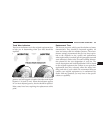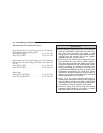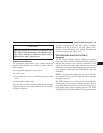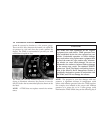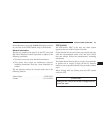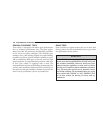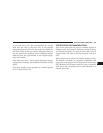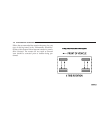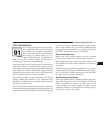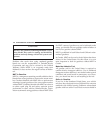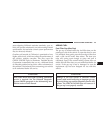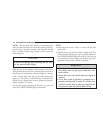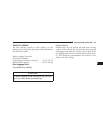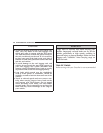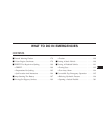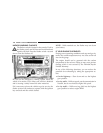
FUEL REQUIREMENTS
Your engine is designed to meet all emis-
sions regulations and provide satisfactory
fuel economy and optimum performance
when using high quality unleaded gaso-
line having an octane rating of 91 or
higher. DaimlerChrysler Corporation re-
quires the use of 91 octane or higher premium fuel to
minimize the potential for engine damage.
Light spark knock at low engine speeds is not harmful to
your engine. However, continued heavy spark knock at
high speeds can cause damage and should be reported to
your authorized dealer immediately. Engine damage
resulting from operating with a heavy spark knock may
not be covered by the new vehicle warranty.
Poor quality gasoline can cause problems such as hard
starting, stalling and stumble. If you experience these
problems, try another brand of gasoline before consider-
ing service for the vehicle.
Over 60 automobile manufacturers around the world have
issued and endorsed consistent gasoline specifications (the
World Wide Fuel Charter, WWFC) to define fuel properties
necessary to deliver enhanced emissions, engine perfor-
mance, and durability for your vehicle. DaimlerChrysler
Corporation recommends the use of gasolines that meet
the WWFC specifications if they are available.
Reformulated Gasoline
Many areas of the country require the use of cleaner
burning fuel, referred to as “Reformulated Gasoline”.
Reformulated gasolines contain oxygenates and are spe-
cially blended to reduce vehicle emissions and improve
air quality.
DaimlerChrysler Corporation supports the use of refor-
mulated gasolines. Properly blended reformulated gaso-
lines will provide excellent performance and durability
of engine and fuel system components.
Gasoline/Oxygenate Blends
Some fuel suppliers blend unleaded gasoline with mate-
rials called oxygenates such as 10% ethanol, MTBE and
ETBE. Oxygenates are required in some areas of the
country during the winter months to reduce carbon
monoxide emissions. Fuels blended with these oxygen-
ates may be used in your vehicle.
STARTING AND OPERATING 171
5



